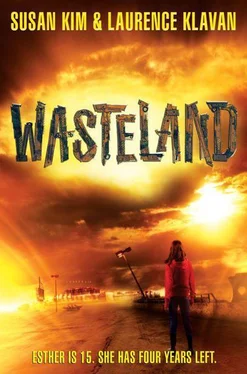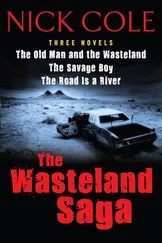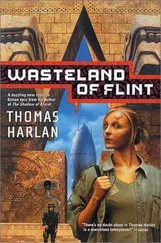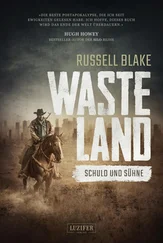The gasoline was exchanged each month for food and water from Levi’s endless supplies. This didn’t include his tuna, soup, meat, jelly, cereal, tomato sauce, peanut butter, stew, pickles, or vegetables; they had long since rotted to blackened tar, exploding their containers. His dry grains and beans were edible, barely, but had to be pounded into flour and boiled for hours before they could be digested. Salt, sugar, spaghetti, honey, and hard candy were available, packaged and sealed in plastic bags, cloth sacks, and cardboard containers; there were also countless gallon jugs of water. Everything was brought outside by Levi’s boys.
There were eighteen of these guards, hulking and hooded brutes armed with small, harmless-looking contraptions that made a terrible hissing sound and, upon contact with skin, could cause a teenager to drop to his knees in agony. (The word “Taser” was printed on the rubberized grips; a dozen had been found in a building on the outskirts of town, one with cobwebbed desks in the front room and barred cells in the back.) Levi’s boys measured the gasoline and doled out the provisions, watching over the transactions with a hawk-like attention that had only grown worse since the supply of untapped cars in Prin began dwindling.
For Eli and his fellow Harvesters, the “Volvo” guaranteed that the exchange would continue for at least a few more weeks. And so by extension would their lives.
“Lucky we found this,” Eli said. “Should last us a long while.”
With that, he bent down and sucked the tube until he sensed the fuel was about a foot from his mouth. Then he yanked out the tube and stuck the end into the neck of an empty plastic bottle, which Till was holding steady for him. A second later, the air was filled with the pungent smell of gasoline as it gushed forth into the container.
Without looking, he addressed Till. “Good eye,” he said.
Till smiled, abashed. “It was your idea to come down here.”
Eli filled one bottle; then, taking care not to spill a drop, he transferred the tube to the next bottle.
Yet something wasn’t right.
Eli looked up. Then he stood. As he did, the tube fell from the bottle neck, sloshing gasoline onto the ground.
“Hey!” Bekkah said. “Watch out!”
“Sorry.” Eli bent to put the tube back into the bottle, which by now was almost full. “I just thought I heard—”
Now he froze in place. It was unmistakable: He could even see the fuel shaking a little inside the bottles.
Something was approaching, fast. Some of what Eli heard wasn’t human, just the faraway thump of tire threads. But he could also detect faint whooping and whistling, a scary celebration.
Eli’s eyes flickered around as he braced himself. Alone on the side of the highway, they were brutally, nakedly exposed. It was too late for them to do anything—to run away, to hide, to even scream for help.
“Aww, no—” Till murmured, under his breath. It was almost a prayer.
And at that moment, it began.
The air was split by noise, a blood-curdling shrieking that seemed to come from no one direction but from everywhere at once, pulsating and echoing. It was an uncanny noise that seemed neither human nor animal.
Bekkah stood still with her mouth half open, a hypnotized mouse in the sights of an owl, the now-forgotten plastic container at her feet overflowing. Gasoline splashed over her sneakers and filled the air with its fumes.
From nowhere, an object whistled at her through the air; it was a fist-size rock, ugly and jagged. There was a sharp cracking sound; it knocked Bekkah from her trance and she emitted a scream, high and thin and terrified. She reeled backward. Clutching her forehead with both hands, she knocked the rubber tubing from Eli’s hands and sent a stream of gasoline flying in a clear arc through the air. Blood spurted from between her fingers and ran down into her eyes. It dripped onto and splattered her filthy white robes. Her knees buckled and she sank to the ground.
Eli was backing up, his eyes darting as he looked in vain for their assailants. His forgotten bike lay on its side only a few feet away. Several rocks flew at him, too, and he ducked them, one arm held up in front of his face, as too late, he remembered the single weapon they had thought to bring with them, an aluminum baseball bat tossed in the back of the wagon.
Behind him, Till was scrambling for the vehicle closest to him, Bekkah’s bike, trying to detach it from the wagon, which he knew would slow him down.
“ C’mon, c’mon, ” he whispered.
But as his useless fingers picked at the knotted ropes, a fresh barrage of rocks was unleashed on him from all directions. Panicked, he gave up and made a dash for the side of the road, crawling into the underbrush to the sounds of jeering and mocking laughter.
And with that, the mutants, shrieking, descended from all directions.
It was impossible for Eli to tell how many there were—ten? Twenty-five? They attacked in a swarm, and at that moment looked exactly alike—all slight of build, androgynous and covered with road dust, with the same bulging lavender eyes and ornate labyrinths of scars and tattoos covering their faces and bald heads. Each wore a meager tunic, with a canvas bag loaded with rocks slung across his or her body.
The bikes themselves were strange-looking and menacing: black and low to the ground, festooned with strips of leather, with weird metal pegs and handles attached to the frames and axles. The mutants rode two to a bike, one pedaling and the other standing behind, straddling the rear tire and balancing barefoot on the foot pegs while wielding their slings, metal clubs, and chains.
Eli had heard tales of these recent and confusing attacks by the mutants, of ambushes sprung from nowhere and for no reason. He had taken comfort in the fact that the mutants had chosen not to kill but saved the worst of their savagery for buildings and objects. Still, hearing of such things was far different from experiencing them firsthand. He was choked with panic.
Covering his face with his arms, Eli ran forward, bent over to make himself as small a target as possible. He was able to reach Bekkah’s side unscathed. Grabbing her under the arms, Eli dragged his unconscious friend to the underbrush, near Till.
From there, Eli watched as the mutants dismounted from their bikes and turned their attention to the car. Soon glass was shattering, heavy chains smashing against metal, and bodies were jumping up and down on the roof. Better the car than them, he thought. He turned to the side and, when he did, his heart skipped a beat.
The two plastic bottles, still brimming over with gasoline, were where he and the others had left them, miraculously untouched by the side of the road. To Eli’s horror, one of the mutants backed into one as she whirled her chain overhead and knocked it over. Shocked, the boy watched as the precious contents glugged out, spreading across the pavement and spilling into the dust by the side of the road.
He was not the only one who noticed.
The biggest mutant, wiry and with a distinct network of swirling scars forming a rising sun across its face, had been standing to one side, arms crossed. Eli noticed the triangular tattoo on its bicep; clearly, it was a male. This mutant had been watching the others attack the car with an unreadable expression. Now, he cocked his head. With one swift movement, he crossed over to the second bottle, which was still full of gasoline. Then, he lifted it by its neck with two fingers in a gesture that seemed almost dainty and carried it back to the others.
Eli knew the mutants traded for nothing. They had no use for Levi’s supplies; mostly, they scavenged and killed wild animals. They didn’t need gas.
Читать дальше












